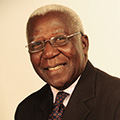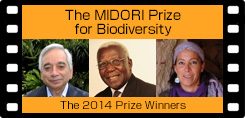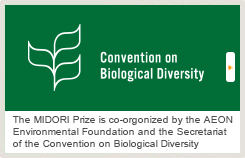The MIDORI Prize for Biodiversity 2014

- Alfred Oteng-Yeboah
- Ghana
Chair, Ghana National Biodiversity Committee
Remarks
Throughout my life I have been very passionate about God’s creation on earth which I believe to have been made for a purpose. My understanding of that purpose is to make life possible for human life, its presence and its well- being.
I associate biodiversity (the living components of creation) and its associated non living parts with life and I agree with the dictum that biodiversity is life insurance. I have therefore committed myself to following local, national and world events that discuss all aspects of biodiversity as well as the services they provide for environmental stability and socio-economic cohesion in development. I therefore listen to experts, discuss with colleagues, offer tangible arguments, contribute to compromises and agree on consensus that makes biodiversity conservation and sustainable use supreme at the household, community, national and global stages of human existence.
I am proud to be found eligible for and selected to receive the prestigious MIDORI Prize for Biodiversity 2014. This is an amazing curve in my life. A curve which is ushering me into a new sphere of life, propelling me into another level of inspiration and at the same time a challenge for biodiversity advocacy.
The MIDORI Prize for Biodiversity, though relatively new at the global scene, has already provided traction for biodiversity at the highest level of policy making in government. I am grateful to AEON Environmental Foundation for considering me worthy to receive it. I dedicate the prize to my country Ghana for the international exposure and to Africa for recognition.
Reasons for Awarding the Prize
Dr. Alfred Oteng-Yeboah (b. 1946) is a leader of biodiversity representing Africa. He has held several important positions at international institutions including Chair of the Subsidiary Body on Scientific, Technical and Technological Advice (SBSTTA). He has led international negotiations on biodiversity from a global perspective and had a worldwide impact. Especially, he has made significant contributions in the establishment and management of the Intergovernmental Science-Policy Platform on Biodiversity and Ecosystem Services (IPBES) through advocating the importance of dialogues between science and policy.
Dr. Oteng-Yeboah has, for many years, fulfilled his role as a representative of Ghana and Africa, especially important meetings for conservation and the sustainable use of biodiversity. His contributions to the Convention on Biological Diversity and other biodiversity-related processes have been very enormous and significant. As well as chairing of the Subsidiary Body on Scientific, Technical and Technological Advice (SBSTTA) 9 and 10, he had held positions at various groups such as relating to forests, oceans and protected areas and capacity building, and participated in the work of the Convention on International Trade on Endangered Species (CITES), the UN Convention on Migratory Species (CMS), the Millennium Ecosystem Assessment (MA) and the Global Environment Facility (GEF). For a number of years he has made a wide range of contributions to biodiversity through serving as Chair of the International Partnership for the SATOYAMA Initiative (IPSI).
Especially, his contribution to the promotion of dialogues between science and policy is noteworthy. Prior to the planning of IPBES, he advocated the importance of dialogues between science and policy and the establishment of an interface between the two. In addition, he played a leading role in organizing the opinions from respective countries for the establishment of the IPBES by serving as a co-chair of the initial international planning committee meetings.
Dr. Oteng-Yeboah is highly evaluated for his great achievements in the process of the global consultation towards establishment of a science-policy interface on biodiversity and ecosystem services.
(*)International Partnership for the SATOYAMA Initiative (IPSI)
IPSI, established in 2010 during the 10th meeting of the Conference of the Parties to the Convention on Biological Diversity (CBD/COP10), is an effort mainly advocated by the Japan’s Ministry of the Environment and The United Nations University Institute for the Advanced Study of Sustainability (UNU-IAS) for the conservation and sustainable use of biodiversity in the secondary natural environment such as farmlands and secondary forests. It is considered that Japan’s “satoyama,” where humans live in harmony with nature, can be a global model for a nature-harmonious society.
Profile
As an advocate for biodiversity policy at the global level, Dr. Alfred Oteng-Yeboah has contributed to the establishment of global mechanisms to raise the profile of biodiversity on the global political scene. He has co-chaired the Executive Committee of the International Mechanism of Scientific Expertise on Biodiversity (IMoSEB) and played an active role during the global consultation process towards establishment of a science-policy interface for biodiversity and ecosystem services since 2005. Consequently he participated in the founding of the Intergovernmental Platform on Biodiversity and Ecosystem Services (IPBES) and acted as a member of an initial international planning committee for UNEP towards the first, second and third meetings for IPBES, co-chaired the first two meetings and acted as the vice-chair for the third. He reviewed the work of IPBES at the eighth session of the Open Working Group of the United Nations General Assembly on Sustainable Development Goals in New York on 3 February 2014, and presented and defended the idea of having a goal on ‘life supporting systems.’
As the chair of the 9th and 10th Subsidiary Body on Scientific, Technical and Technological Advice (SBSTTA), he successfully steered the Subsidiary Body and the Convention towards the consideration of specific targets and goals as strategies to achieve a substantial reduction in the loss of global biodiversity by 2010. He chaired many contact groups at SBSTTA and COPs including those on Biofuels, Sustainable Use with the SATOYAMA Initiative, Forests, Marine Areas Beyond National Jurisdiction, the Global Taxonomy Initiative, Capacity Building, and Protected Areas. As Vice-Chair for the Standing Committee of Convention on International Trade on Endangered Species (CITES), Dr. Oteng-Yeboah chaired a group to draft a strategic vision which was adopted by the Standing Committee at its 54th meeting. As a member of the Scientific Council for the UN Convention on Migratory Species (CMS), he spoke on behalf of Africa and stressed the need for scientific advice to secure the migratory routes. He also served as a member of the International Advisory Committee for UNESCO Biosphere Reserves for a three-year assignment, and provided support for the revision of the establishment of new Biosphere Reserves. As a board member of the Millennium Ecosystem Assessment (MA), he contributed to the production of the assessment report on the world’s ecosystem resources. His contributions to biodiversity related international mechanisms are enormous. Currently he is supporting the promotion of sustainable use of biodiversity through serving as Chair of the Ghana National Biodiversity Committee and Chair of the Steering Committee of the International Partnership on the SATOYAMA Initiative (IPSI).
Dr. Oteng-Yeboah, who has played a role of interface between science and policy, has been giving strong impacts not only to young Africans but also to people from other parts of the world, and especially to the beginners of international negotiations on biodiversity.
* This profile was prepared in 2014.
Biographical Summary
- 1946
- Born in Tafo, Eastern Region, Ghana
- 1968
- B.Sc. University of Ghana
- 1972
- Ph.D. University of Edinburgh
Record of Honors and Awards
- 1969-1970
- UNESCO Scholar to Edinburgh University
- 1970-1972
- Ghana Government Scholar to Edinburgh University
- 1972
- Elected Fellow of the Linnaean Society of London (FLS)
- 1975
- UNESCO Scholar to British Council course on Resources in Higher Education, London (July to December)
- 1991
- Swedish Institute (SI) Fellowship for a 6-month research at the Dept. of Ecological Botany, Uppsala University, Sweden (July to December)
- 1995
- Elected Fellow of the Ghana Institute of Biology
Related Websites
African Centre for Technology Studies (ACTS) African Forest Forum Bioversity International Convention on Biological Diversity (CBD) Convention on International Trade in Endangered Species of Wild Fauna and Flora (CITES) Convention on Migratory Species (CMS) Council for Scientific and Industrial Research Environmental Protection Agency, Ghana UNU Institute for the Advanced Study of Sustainability (UNU-IAS) Intergovernmental Science-Policy Platform on Biodiversity and Ecosystem Services (IPBES) International Partnership for the SATOYAMA Initiative (IPSI) University of Ghana UNEP Ghana National Commission for UNESCO IUCN A Rocha










